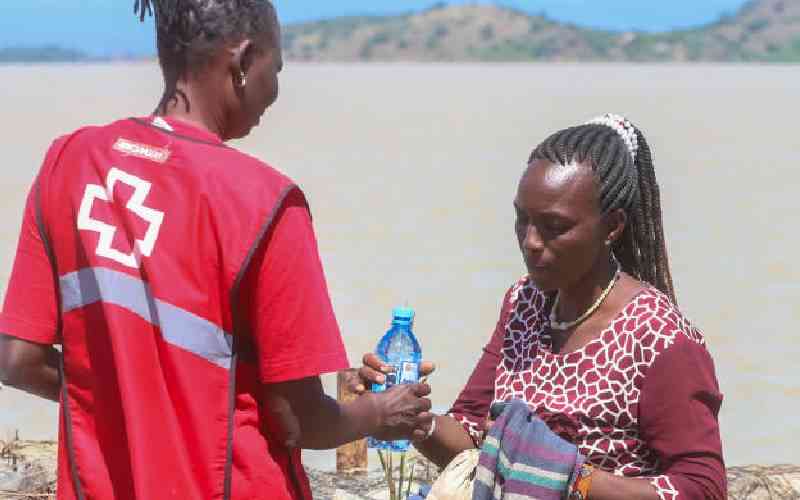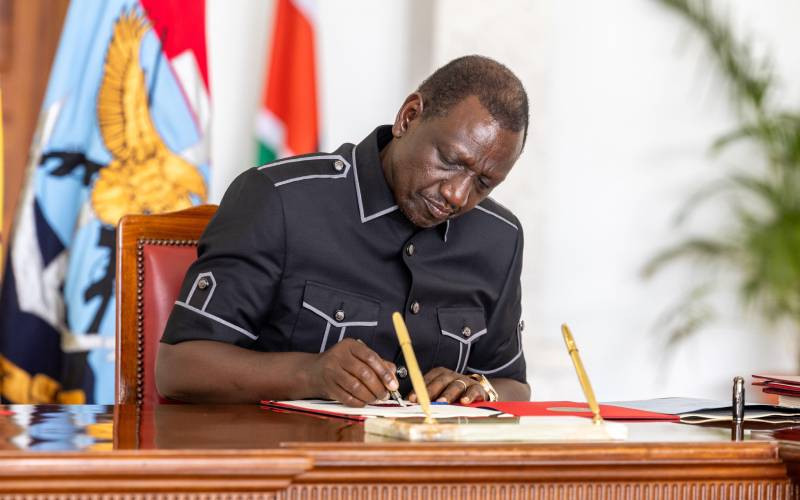By Benard Sanga and Willis Oketch
Despite Friday’s ODM elections fiasco, leaders from the Coast say they have not lost the war and will return to win the election with the same formula and line-up.
Mombasa Governor Hassan Joho seems to have energised Coast politics and cemented his position as the political supremo of the region, achieving a fete the late Shariff Nassir took years to achieve.
Mr Owen Baya, who until recently was a lecturer at Pwani University, says the Jubilee coaltion is unlikely to gain support in the region even after Friday’s chaos because the region’s support for party leader Raila Odinga is intact.
Dr Baya argues that Coastal people support ODM because of Raila “and will move with him to any other party because they believe the former Prime Minister identifies with and articulates the problems of the region.”
Joho told The Standard on Sunday that “young people at the Coast residents support ODM and want Raila to remain in charge.” To Kilifi Governor Amason Kingi: “ODM is our life because it represents the struggle against marginalisation and oppression”.
In less than 10 years, Joho appears to have rallied Coast residents to the party – the only counties at the Coast wher ODM is not strong in are Lamu and Tana River. Kingi argues that the current realignment around the Mombasa governor present’s the region’s best “option to ascend to power.”
Oratory skills
Mr James Karani, a Mombasa-based analyst, says Joho has achieved his new status due to a combination of factors. He says that besides his financial resources, Joho has proven to be a dependable political mobiliser Raila cannot afford to lose.
He says Joho, who first tried his hand in politics in 2006 following former Cabinet Minister Karisa Maitha’s death, is the reason PNU and Jubilee lost in Kilifi, Mombasa and Kwale counties in the 2007 and 2013 polls.
The political analyst argues that “as long as the name Kenyatta remains on the ballot, most Coastal voters will remain skeptical of Jubilee given that most people here associate the land problem with the late Mzee Jomo Kenyatta.”
“He (Joho) has improved his oratory skills immensely since winning the 2007 Kisauni parliamentary seat. He managed to avoid sectarian and tribal tendencies in the diverse region, winning support among the Miji Kenda and upcountry voters,” says Karani.
During Friday’s elections at Kasarani, Coast delegates waged an unsuccessful onslaught against the creation of two deputy party leader position. When they staged a walkout, Joho and his key ally, Mombasa Senator Hassan Omar, persuaded them to return to the conference.
Delegates from Western and North Eastern provinces who had earlier been perceived to support Coast’s opposition fizzled out in the acclamation contest. Coast delegates support Budalang’i MP Ababu Namwamba against nominated Senator Dr Agnes Zani for the secretary general’s seat.
Wundanyi MP Thomas Mwadeghu, the chairman of the five member committee that negotiated the deal between Western and Coast delegates, says that despite what transpired on Friday, the region will still stick with its earlier plan when repeat polls are called.
Stay informed. Subscribe to our newsletter
“The only amendment the region was opposed to was the creation of two deputy party leader slots. We were comfortable with other amendments but we will not lose sight and we will continue with our plans,” he said.
Mwadeghu told The Standard on Sunday that nominated MP Isaac Mwaura, whose actions appeared to spark the chaos on Friday, has never been in the Joho-Namwamba line up although he had occasionally been given the chance to address the delegates during their campaigns.
ODM chief whip and Kilifi North MP Gideon Mung’aro, who is in the Joho-Namwamba line-up, said that what happened in Kasarani had re-energized the region’s leaders’ call for Coast unity.
Last minute entry
“Whether with a party or not, it is clear that we (Coast region) need to unite. On the amendment we actually won because it [proposed changes] is subject to the leadership that will be elected and I’m sure our team will thrash it once they are elected,” said Mung’aro.
Joho’s last minute entry into the ODM polls tilted the scale by rallying the Coast ODM leaders from the Mijikenda sub-tribe and other regions at the Coast to support Namwamba.
Political analysts say this brought to fore Joho’s political shrewdness and ability to play his cards close to his chest to the last minute in what they term as “a rope-a-dope strategy”.
The rope-a-dope strategy, associated with legendary American boxer Muhammad Ali, is a method of tiring out a boxing opponent by pretending to be trapped on the ropes while the opponent expends energy on punches that are blocked. In this strategy Joho appears to have retired former nemesis Najib Balala from active politics and consigned his main challenger at the March 2013 gubernatorial race politically impotent for now.
Joho announced his line up on February 21 after months of uncertainity over which position he will vie for. He and Namwamba embarked on an airborne campaign across the country.
But opinion at the Coast remains divided on whether Joho was playing a kingmaker in the party’s election or if he was himself fighting for the throne.
Though he instituted Mwadeghu’s committee to explore the region’s chances in the polls, it has emerged that he started to scheme for the party’s leadership three months ago and even reached an agreement with Kilifi governor Amason Kingi.
“I was also interested in the ODM deputy Party Leader position but after long negotiation with my brother Mombasa governor Hassan Joho I decided to step down for him. Actually our last negotiations were held in Dubai,” said Kingi in a recent interview.
He reiterated that Coast leaders sacrificed Dr Zani for Joho as he “presented the best option for the region to ascend into power”.
 The Standard Group Plc is a
multi-media organization with investments in media platforms spanning newspaper
print operations, television, radio broadcasting, digital and online services. The
Standard Group is recognized as a leading multi-media house in Kenya with a key
influence in matters of national and international interest.
The Standard Group Plc is a
multi-media organization with investments in media platforms spanning newspaper
print operations, television, radio broadcasting, digital and online services. The
Standard Group is recognized as a leading multi-media house in Kenya with a key
influence in matters of national and international interest.
 The Standard Group Plc is a
multi-media organization with investments in media platforms spanning newspaper
print operations, television, radio broadcasting, digital and online services. The
Standard Group is recognized as a leading multi-media house in Kenya with a key
influence in matters of national and international interest.
The Standard Group Plc is a
multi-media organization with investments in media platforms spanning newspaper
print operations, television, radio broadcasting, digital and online services. The
Standard Group is recognized as a leading multi-media house in Kenya with a key
influence in matters of national and international interest.







